Just days after posting an “In Praise of… Leo Baxendale” feature, focusing on his later, creator-owned material, we’re sorry to report his passing.
I know this is a loss is going to hit a lot of my friends hard, especially those who know or worked with him, such as Tony Bennett at Knockabout, or Joe Gordon at Forbidden Planet International, with whom he corresponded. Many comic creators, too, such as The Guardian‘s Steve Bell, cite Leo as a powerful influence on their life and work. My sympathies to them all at this time, and especially Leo’s family who, out of respect to them, we delayed publishing this tribute until now.
It also comes as the Lakes International Comic Art Festival was preparing to celebrate his life and work with a permanent exhibit of one of his artworks at Kendal Town Hall, which will be on display in time for this year’s Festival weekend.
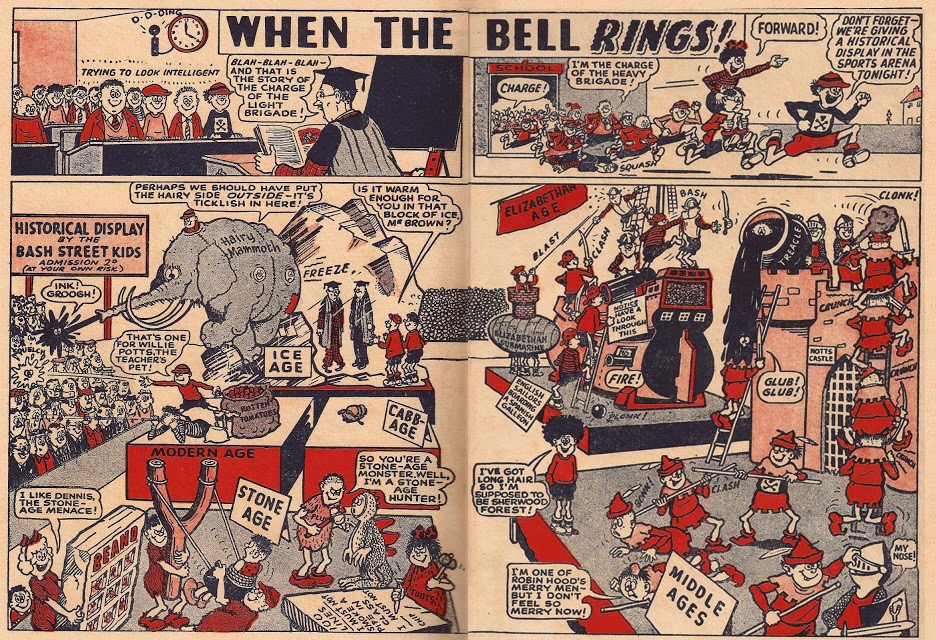
“When the Bell Rings” – the early incarnation of “The Bash Street Kids”, a strip that has appeared in every issue of The Beano since 1956. © DC Thomson
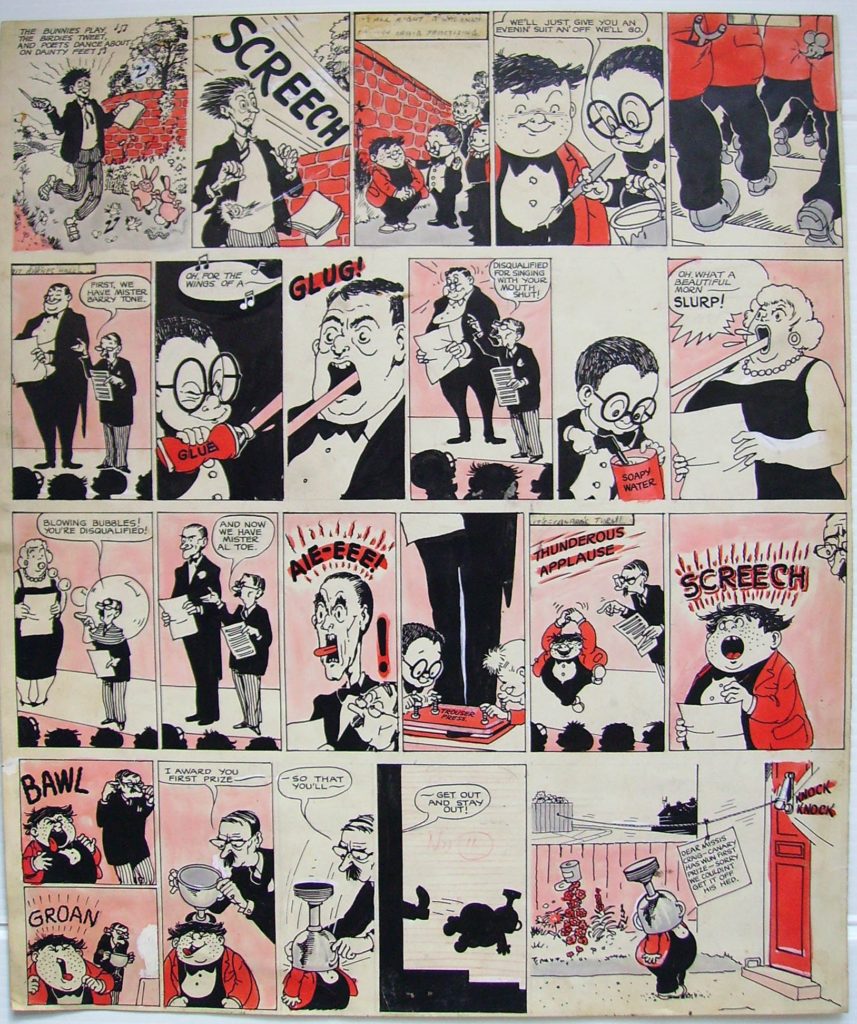
Leo’s art for “The Banana Bunch – ‘Canary’s Pet Ambition’:, which featured in The Beezer Issue 29, cover dated 4th August 1956
Born in Lancashire on 27th October 1930, Leo was, as many will note in coming days, an inspirational figure in the world of British comics, rightfully described as “one of the genuine innovators of British comics” by comics archivist and author Steve Holland.
Most of his fans will remember him as the creator of the Beano strips “Little Plum“, “Minnie the Minx“, “The Bash Street Kids” (first published as “When the Bell Rings”) and “The Three Bears“, but for me it’s his work in the 1960s for WHAM! – particularly that superlative, wickedly funny character Grimly Feendish, foil to Eagle Eye, star of “Eagle-Eye, Junior Spy“, that I enjoyed most.
As the Comic Creators Project notes of his work of that time, Baxendale was free to experiment with page layout and full colour in the pages of WHAM!, and he attempted to break the mould of older strips by the use of bizarre humour, outrageous puns, and surreal plots. His joyful creativity that resulted from these experiments are clear to see on the page. He would take such mania even further with his later work.
(Among others, “Eagle-Eye, Junior Spy” was later translated into French in the Disney magazine Journal de Mickey as “Archibald Razmott. Mini-Barbouze de Choc”, while his arch enemy Grimly Feendish was known as Sinistroteur. In a feature about Leo, which includes two fascinating interviews, Paul Gravett notes episodes were later compiled into six very limited-edition hardback albums, which have never been reprinted in English).
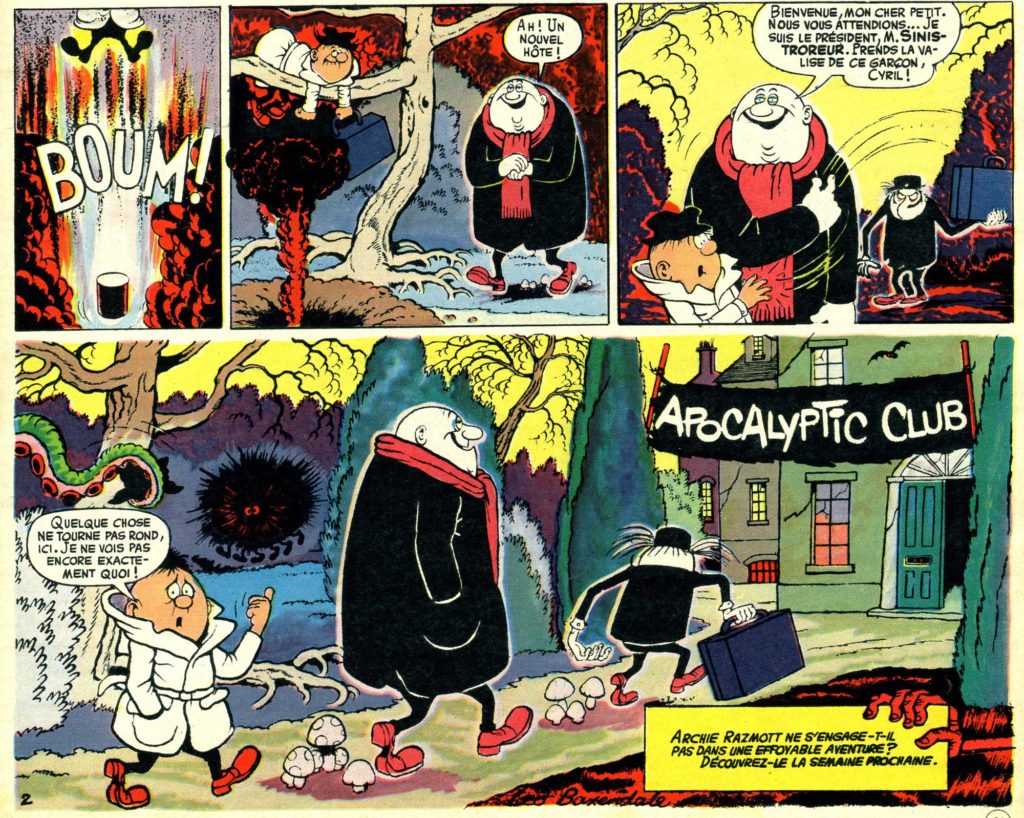
Leo Baxendale’s “Eagle-Eye, Junior Spy” was later translated into French in the Disney magazine Journal de Mickey as “Archibald Razmott. Mini-Barbouze de Choc”, while his arch enemy Grimly Feendish was known as Sinistroteur
Other fans might recall his later, creator-owned work, such as Willy the Kid, which Richard Sheaf focused on in his article.
For cartoonists such as Lew Stringer, he was, and will remain, a hero, rightly describing him as a giant in our industry.
“I first saw Leo Baxendale’s work on the covers of WHAM! No.77 (4th December 1965) and it appealed to me right away,” Lew tells us. “From that moment, he became my favourite humour artist and I became inspired to create my own comics. He was not only a master of making the characters and situations look genuinely funny, but he added little amusing details such as clockwork Daleks in the background that made reading his strips an intricate experience.
“The impact of his work on British humour comics is incredible, as other artists were encouraged by editors to mimic Leo’s style. The Beano simply wouldn’t look like The Beano without Leo’s influence, and it’s debatable whether the Beano would even still be around if it had never featured ‘The Bash Street Kids’ or ‘Minnie the Minx’. He was quite simply the most influential artist in UK humour comics.”
“Leo was a larger than life character (the stories of his brief reign as king of comics at the Beano are legion, exciting and unrepeatable!),” notes Beano cartoonist Nigel Parkinson, “and his self-taught tremendous energy and vitality made all his strips as hilarious as anything ever published. To this very (sad) day, he’s the only comic artist to have made me laugh out loud.
“In WHAM! And SMASH! He introduced possibly his greatest and funniest character, the slimily evil Grimly Feendish and the one picture he did that inspired and thrilled me beyond everything was his cover of Bad Penny on SMASH! Number Three. I kept that comic with me every day from February 1966 until today, the only comic I ever salvaged from my mum’s eternal spring cleaning drives. In 1994 I was able to tell Leo himself. He said he remembered being very pleased with the way it turned out.”
“He’s been a hero to me since I was a kid,” comments VIZ cartoonist Dave Jones. “I loved his Badtime Bedtime Books and strips like ‘Clever Dick’ in the mid-1970s without being aware of his name. Then I bought his autobiography A Very Funny Business just before my 11th birthday in January 1979, with a Christmas book token, and read it over and over. I became a bit obsessed, and even took it with me on family holidays.
“Leo later wrote ‘Once the imagination of a child is set alight, it takes persistent dousing with cold water to put out the fire.’ It’s clear from the many tributes that several generations of Baxendale’s readers remained undoused, which is a pretty good legacy.”
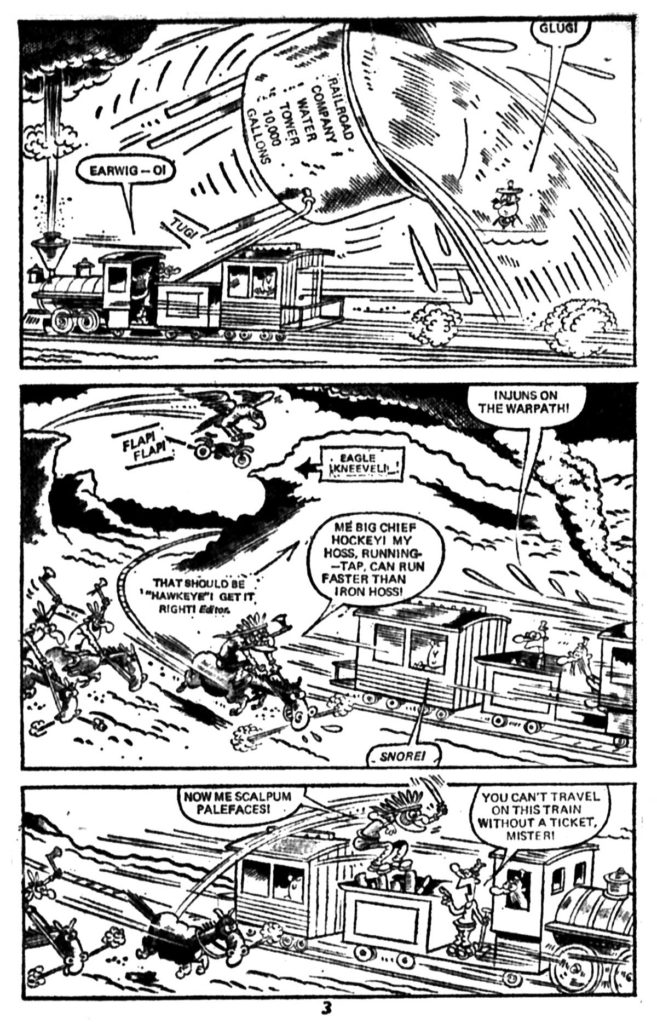
A page from “Davey Jones”, a Badtime Bedtime Book included as a special pullout-style supplement for Monster Fun Issue 10, published in August 1975
“For British cartoonists he’s an influence so early that we weren’t even aware we were being influenced,” says artist Jonathan Edwards. “All my memories of school look like Baxendale drawings.”
Leo’s eldest son Martin, who also works as a cartoonist, said Leo was “an impossible act to follow”, The Guardian notes.
“His drawings were always both very, very funny and sublimely well drawn,” he added. “Michelangelo’s Sistine Chapel ceiling to my greetings card and gift-book scribbles. He cast a long shadow and will be greatly missed now he’s gone.”
“From Beano to WHAM! to Willy the Kid, he did so much more than revolutionise British comics,” comments comic archivist, author and publisher Paul Gravett. “He inspired in his readers young and old an anarchic, free-thinking spirit to challenge authority and be yourself.”
“Not many truly deserve the epithet ‘legendary’ but Leo Baxendale does,” notes musician Billy Bragg. “A true genius of British comics.”
“Cartoons are very important things,” noted poet U A Fanthorpe at the opening of his “Stroppy Women” exhibition back in 2010, They’re serious, not just funny. And this is especially true of Leo Baxendale’s cartoons. They are secret weapons. They reach the parts of us that other forms of discourse fail to reach. Laughter liberates us, laughter puts things in perspective.”

1976. Leo Baxendale receives the Ally Sloper Award at “Comics 101” from Bob Monkhouse and Denis Gifford. (via Cartoonists Pics)
Eyestrain and a repetitive strain injury finally forced this powerhouse of a talent to stop drawing, whose first work was for the Lancashire Evening Post, doing drawings to illustrate articles and adverts before joining The Beano in the early 1950s, but this setback never stopped him inventing, even while being interviewed, and he of course continued to promote the comics form with numerous exhibitions, that work recounted on his official website.
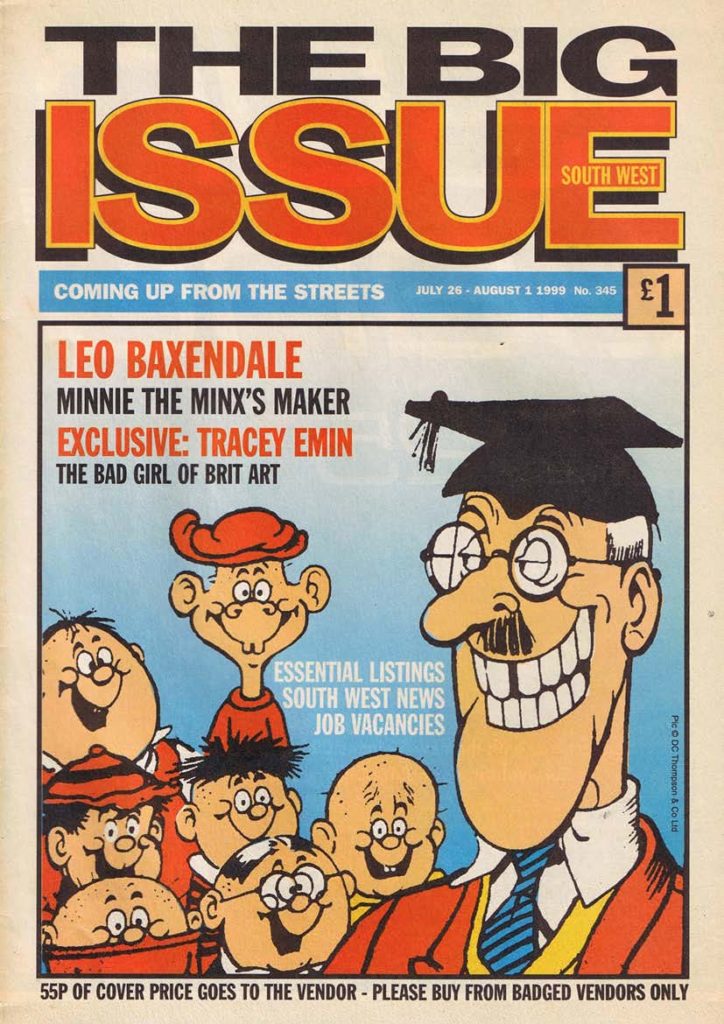
Leo Baxendale was interviewed by The Big Issue in 1999, telling the paper he was very comfortable with “practical joke humour”
Despite no longer drawing in later life, he said he told his local magazine he didn’t miss it, repeating a story he told The Big Issue way back in 1999.
“Oh no,” he said, pragmatically, “I don’t miss drawing at all. Even though I found it more exhilarating than anything else. Steve Bell (the political cartoonist) once said to me, ‘You can’t stop drawing! You’re an artist!’
“I said, ‘Just because I can do something doesn’t mean I have to’. And Steve said, ‘Fair enough’.”
Although the characters he created for DC Thomson were the subject of a drawn-out legal dispute over creator rights, he regarded his early creations, such as Minnie the Minx, with much affection in later life.
“I didn’t work in the office, but I visited a couple of times a week,” he recalled of his time at The Beano for The Guardian in 2003, as the weekly humour comic celebrated its 70th birthday. “We came up with ideas through weekly games of keepy uppy – I would take a drawing in, they would push the office furniture back, and while the ball was flying, destroying the furniture, ideas would be flying too – we would pass the ideas around with the ball. Once we had a full idea for a Bash Street episode, the chief sub-editor would run for a piece of paper and scribble it down.
“Comics were beginning to surge in popularity: when I first went to the Beano in 1953, it was selling 400,000. By 1958, it was selling two million.”
Minnie the Minx was just one of the characters he created.
“Minnie – a girl of boundless ambition,” he recalled of The Beano‘s female counterpart to Dennis the Menace. “She was convinced that certain characters were trying to hold her back – and she was probably quite right. She didn’t have any magic powers or superhuman strengths but she was an Amazonian warrior – the power was in her mind.
“When I was creating my characters for The Beano, I made them part of an uncertain world,” he recalled, “and there were two strands to this world. One was the medieval concept of disasters happening out of a blue sky for no reason whatever. And the second one was the more modern idea of cause-and-effect. Very often, the ambitions that made my characters set events in train led to disaster; but the thing was, they were absolutely unaware of this so they made the same errors again and again.”
Inventive, thought-provoking and above all, very, very, funny, Leo Baxendale helped shape so much of British comics and his legacy lives on still, not only through his own work but the work of those for whom he was a major influence – and one, he was very much aware of.
“After A Very Funny Business [Leo’s autobiography, published by Duckworths] in 1978, I got a fan letter from Alan Moore, who was just starting his career,” Leo told Paul Gravett. “He’d imagined that pros like me rattled off five pages before breakfast and was so relieved to read that I got tired and did stupid things because of lack of sleep. Alan Moore, Steve Bell, Savage Pencil and others have taken the ethos of my work, The Beano Spirit, that uninhibited outlook, and they’re carrying it on in their own work. I think that’s wonderful.”
“Leo was the first one of us to put his head above the parapet and fight for a proper rights deal,” 2000AD creator Pat Mills notes. “He was certainly an encouragement to me and others to fight for our rights. In the miserable times we live in, where most keep their heads well down, and have done for a generation or so, he’s a shining example of what is possible.
“Some years ago, Leo joined Alan Moore, Steve Bell and myself on a political comic tour,” he told me earlier today. “I recall Leo telling me that the Bash Street Kids were always subversive and on their first story he had them hi-jacking a tank and driving it into a police station. That’s an impressive legacy for us all to live up to. He was a massive and very positive influence on all of us in British comics.”
Leo’s last piece of comic work was writing a page of Bryan Talbot’s Alice in Sunderland, with him and Bryan as characters.
“I drew it in a mixture of our styles,” Bryan tells us. “He’d asked what I was working on and, when I told him, asked to see the script. Having read it, he spontaneously wrote the one-pager and sent it to me. I had to work it in there, obviously!”
Later this year, the Lakes International Comic Art Festival will install a specially-made print of one of his artworks, “Baby Basil Does His Bit” in the Brewery Arts Centre, a permanent tribute to an extraordinary creator.
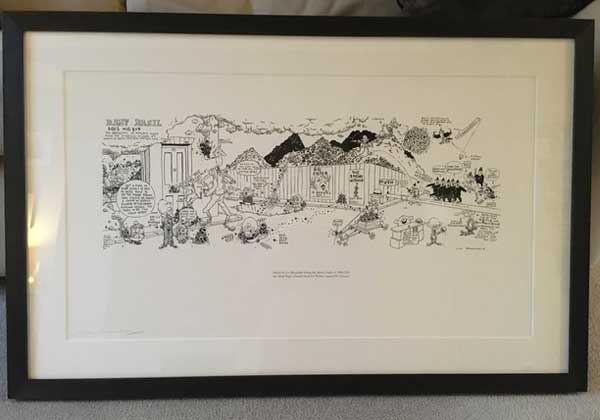
This specially-made print of “Baby Basil Does His Bit” by Leo Baxendale is to go on permanent display in the Brewery Arts Centre later this year
“It’s a real honour for us to have this, says Festival Director Julie Tait.
“My entire life has been ‘Art & Science Entwine’,” he told the Festival organisers on donating the print, “and I am happy for this one inkjet image to stand for my life’s work, and to be put to potent use.”
It is, I think you’ll agree, a very fitting tribute. Whether he likes it or not though, it will not be the only one.
Thank you, Leo Baxendale. You will be very, very much missed.
Leo Baxendale, cartoonist, born 27 October 1930; died 25 April 2017. Leo is survived by his widow Peggy; children Martin, Carol, Stephen, Heather and Mark; grandchildren Rosie, Jacob, Zuza, Jo, Misho, Eloise, Joel, Jake, Owen, Tamsin; great grandchildren Rupert, Barney and Zoe
Web Links
• Leo Baxendale’s official website is here: www.reaper.co.uk
Comic Creator Tributes
• Leo Baxendale obituary by Steve Bell (The Guardian)
“I was one of the many children so influenced by Leo’s work in the 50s, who never even knew his name until much later on. Although he was largely self-taught as an artist, no one could hold a candle to him in the field of comic draughtsmanship. His characters are so spare, so expressive and so anatomically outrageous, yet their comic structure is so perfect as to be pretty well inimitable, though many of us have tried, and will keep on trying.”
• Martin Baxendale, a cartoonist himself, pays tribute to his father on Comic Creators Project UK
• Leo Baxendale Remembered, by Beano artist Nigel Parkinson
• A tribute to Leo Baxendale by comic creator Lew Stringer
• Joe Gordon remembers Leo Baxendale on the Forbidden Planet International blog
• Leo Baxendale: A Tribute by Steve Holland
• Paul Gravett has a feature and two interviews with Leo on his excellent website here
Interviews
• An interview with Leo Baxendale, published in Big Issue (1999 – PDF)
• Read the 2010 interview with Leo Baxendale for Cotswold Life
In His Own Words
• The Guardian, 30th July 2003: “Bash Street, the Beano and me”
Leo Baxendale recalls how the exploits of Dennis the Menace and co were dreamt up during games of office football
Features
Richard Sheaf highlights Leo’s later work, such as Wicked Willy, here on downthetubes
• Artist Highlights: Leo Baxendale
A tribute to Leo on the Cartoon Museum’s Comic Creators project
• In 2013 Leo was awarded a Lifetime Achievement British Comic Award and that is marked here
Jeremy Briggs feature on “Danny Dare” for WHAM!, which initially blended art by Leo Baxendale with artists on the “Dan Dare” strip for Eagle, although he only signed three of the published strips – in Issues One, Four and Eight
• Badtime Bedtime Books – A Checklist
A guide to every “Badtime Bedtime” story published in Monster Fun, including those by Leo
The Damned – Grimly Feendish
Leo Baxendale: His Passing Marked
• BBC News
• 24 365 News (Mirror of BBC News item)
• The Chorley Guardian: Tributes to Preston cartoonist Leo Baxendale
• Comics Beat: RIP Leo Baxendale, Comics Legend
“While those of us Stateside may not feel the protean influence of Baxendale,” writes Heidi Mac Donald, “the appeal of his manic energy and imagination-engaging landscapes and inventions are evident to anyone who loves comics and art.”
Mike Stirling, head of Beano Studios Scotland, told the Courier: “It’s very sad news and everyone at Beano and DC Thomson would like to share our deepest condolences. I had the pleasure of speaking to Mr Baxendale while we were writing the History of The Beano, something he was obviously a massive part of.
“I was thrilled when he kindly sent an incredible personalised illustration wishing Beano a happy 75th birthday in 2013. I’m really sad he won’t be here in person to celebrate our 80th with us next year, but his legacy will be. We’ll proudly continue to share his creative brilliance as an inspiration for everyone.”
• Daily Telegraph Obituary (Registration Required)
• Gizmodo: Remembering Leo Baxendale, Creator of Minnie The Minx & The Bash St Kids
Article by Holly Brockwell
• Gloucestershire Live Obituary: Leo Baxendale, the cartoonist who created the Bash Street Kids
• The Oink! Blog by Phil Boyce
• The Sun
Interviews
• Forbidden Planet International Blog – Last Word from Leo: An Interview with Leo Baxendale (published October 2017)
All images © respective copyright holders. The rights of Leo Baxendale to be identified as author of The Bash Street Kids, Minnie the Minx, Little Plum, The Three Bears, and The Banana Bunch, have been asserted in accordance with ss. 77 and 78 of the Copyright, Designs and Patents Act 1988
The founder of downthetubes, which he established in 1998. John works as a comics and magazine editor, writer, and on promotional work for the Lakes International Comic Art Festival. He is currently editor of Star Trek Explorer, published by Titan – his third tour of duty on the title originally titled Star Trek Magazine.
Working in British comics publishing since the 1980s, his credits include editor of titles such as Doctor Who Magazine, Babylon 5 Magazine, and more. He also edited the comics anthology STRIP Magazine and edited several audio comics for ROK Comics. He has also edited several comic collections, including volumes of “Charley’s War” and “Dan Dare”.
He’s the writer of “Pilgrim: Secrets and Lies” for B7 Comics; “Crucible”, a creator-owned project with 2000AD artist Smuzz; and “Death Duty” and “Skow Dogs” with Dave Hailwood.
Categories: British Comics, Creating Comics, downthetubes Comics News, downthetubes News, Obituaries
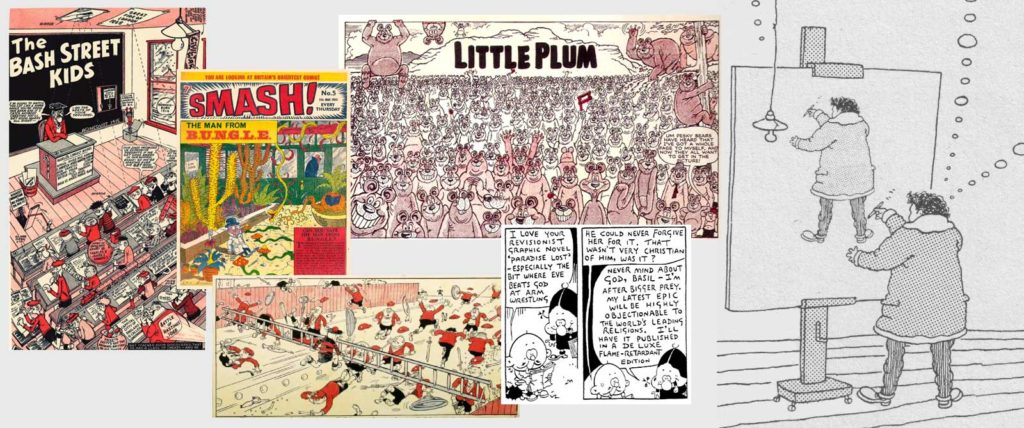
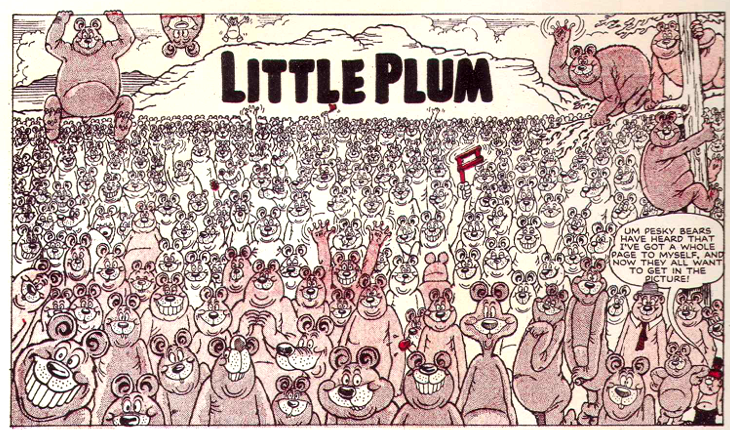
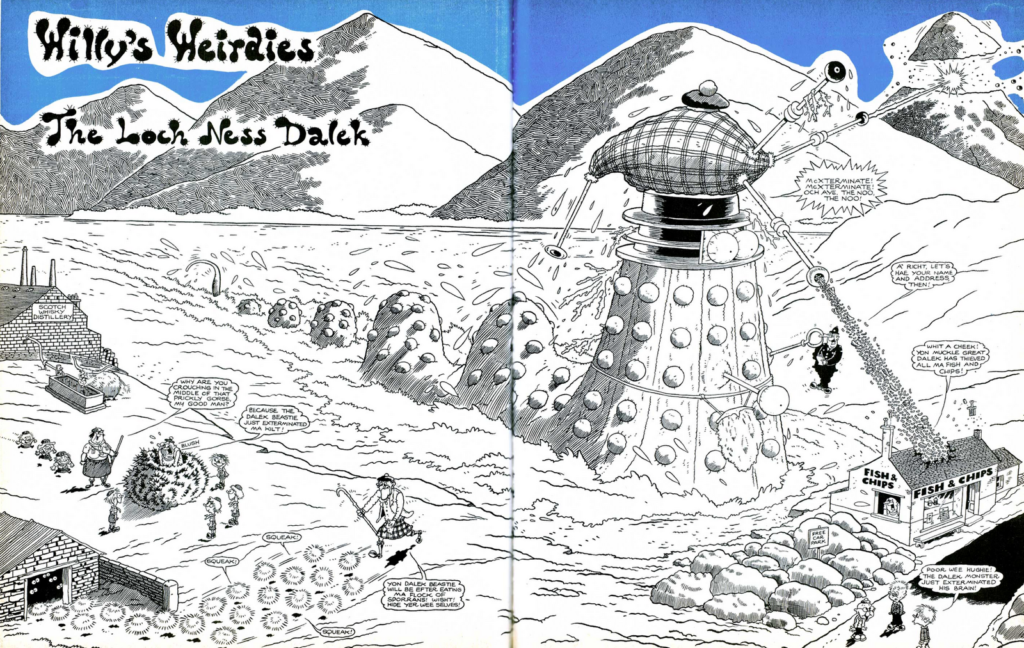
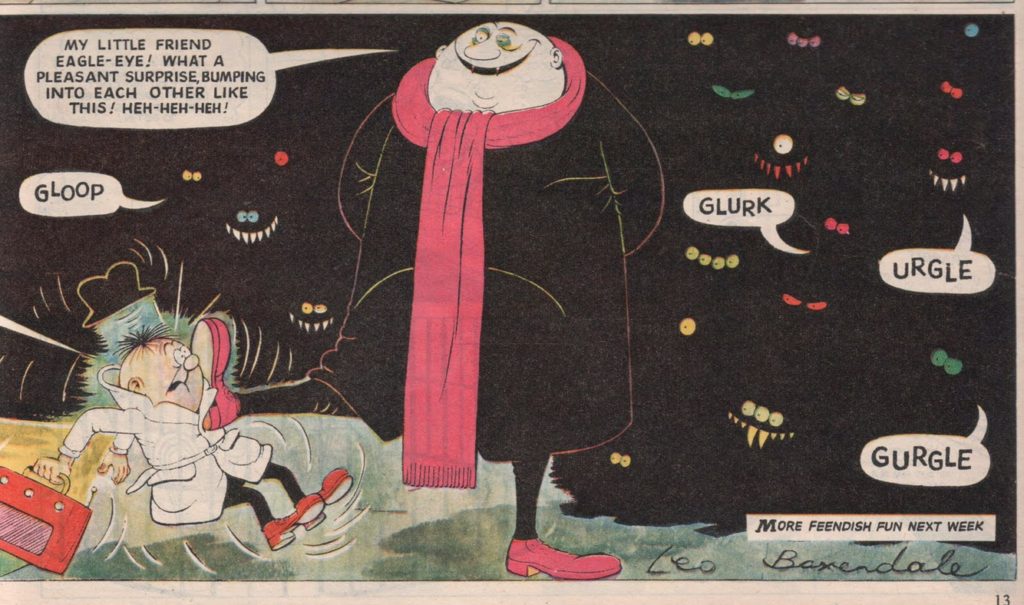
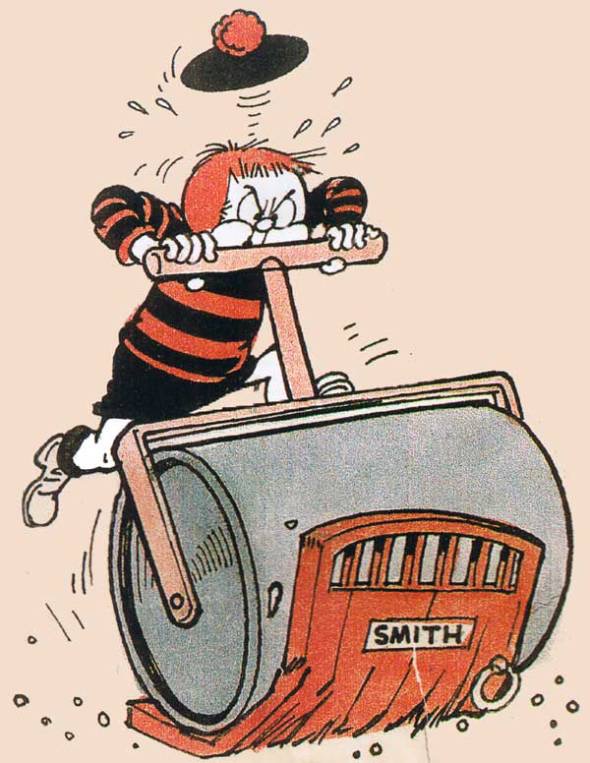
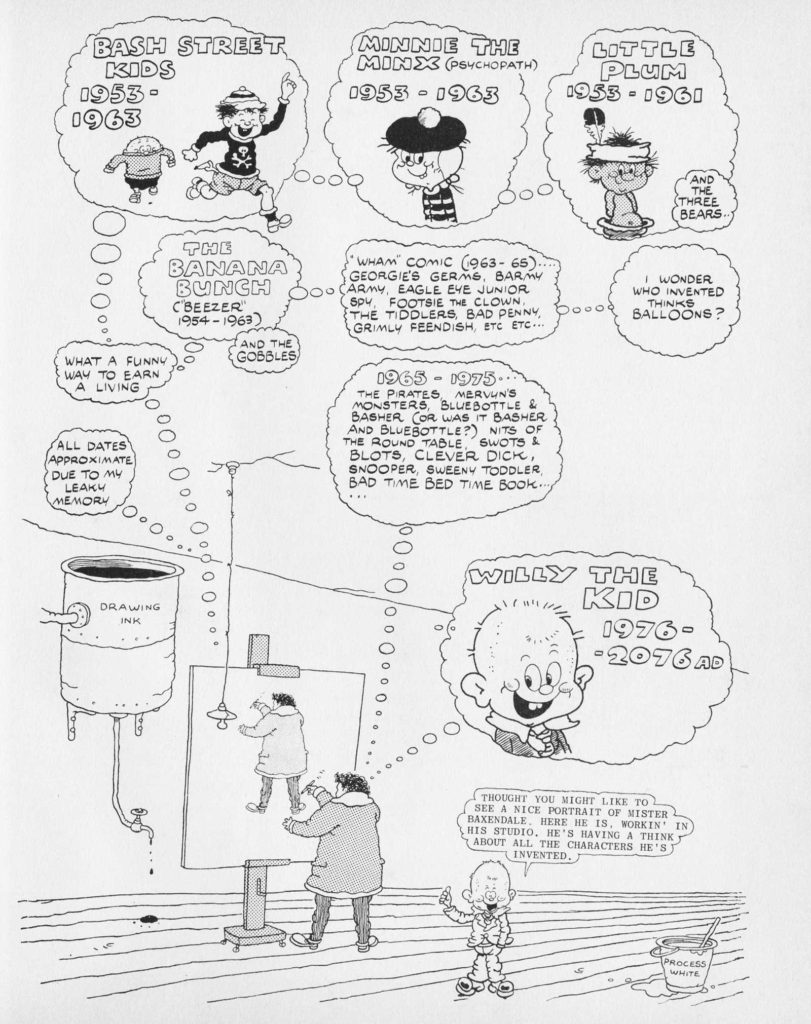
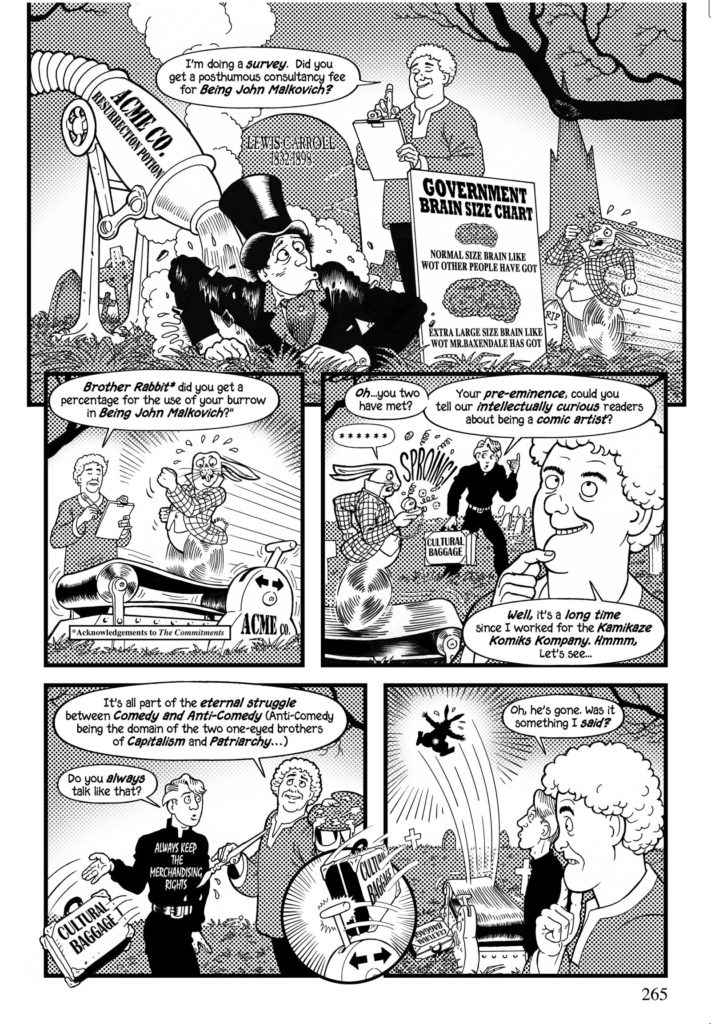
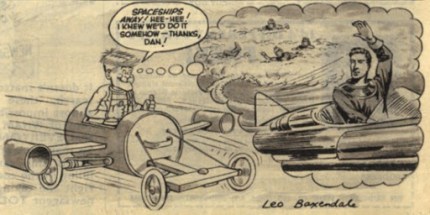
 In Memoriam: Comic artist and colourist John Michael Burns
In Memoriam: Comic artist and colourist John Michael Burns  In Memoriam: Cartoonist and Wildlife Artist Phil Baber
In Memoriam: Cartoonist and Wildlife Artist Phil Baber  Remembering Jon Haward: A Tribute by Tim Perkins
Remembering Jon Haward: A Tribute by Tim Perkins  In Memoriam: Comic Artist Jon Haward
In Memoriam: Comic Artist Jon Haward